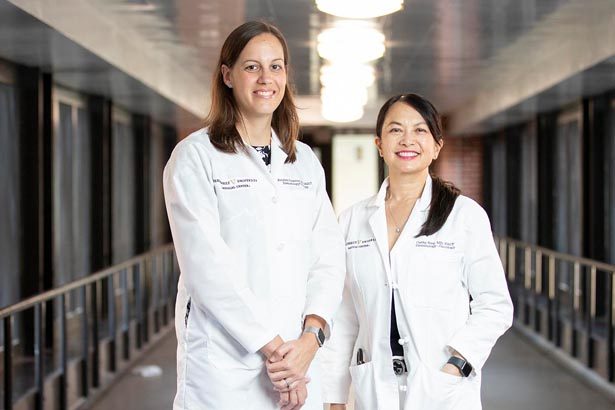Breakthrough Therapies
Studies advance care options for patients with colorectal cancer
November 7, 2022

Vanderbilt-Ingram Cancer Center (VICC) physicians are leading two landmark clinical trials that have the potential to greatly expand care options for people with colorectal cancer.
One offers a new option for metastatic colorectal cancer that has not responded to existing treatments. The other could bring about a paradigm shift in how rectal cancer is treated among a subset of patients.
The new treatment option for metastatic colorectal cancer is on the horizon following an international clinical trial led by co-principal investigator Cathy Eng, MD, professor of Medicine. The findings from the FRESCO-2 study were presented Sept. 12 in Paris during the European Society of Medical Oncology Congress. The phase 3 clinical trial of fruquintinib — a targeted therapy that inhibits the enzymes pivotal to a tumor’s ability to form blood vessels — improved survival.
The median overall survival was 7.4 months for patients treated with fruquintinib compared to 4.8 months for those who received standard therapy.
“Our positive findings in this heavily pretreated patient population who had received a median of five prior lines of therapy noted an improvement of 2.6 months relative to the control for overall survival as well as a difference of 1.9 months for progression-free survival,” said Eng, the David H. Johnson Professor of Surgical and Medical Oncology and co-leader of the Gastrointestinal Cancer Research Program at VICC.
Fruquintinib was granted fast track designation in June 2020 by the U.S. Food and Drug Administration. The designation expedites the development and review of drugs that have the potential to fulfill unmet needs. Currently, there are no approved effective treatments in the U.S. for metastatic colorectal patients who have progressed on standard treatments. FRESCO-2 was conducted in the United States, Europe, Japan and Australia. China’s drug review agency approved fruquintinib in 2018 after a clinical trial there showed that the drug improved overall survival.
Fruquintinib is an oral medication that is well tolerated.
“I am delighted that Vanderbilt-Ingram Cancer Center co-led this global trial. Our findings clearly demonstrate the benefit of single agent oral fruquintinib for overall survival and progression-free survival in previously treated metastatic colorectal patients. FRESCO-2 demonstrates the importance of patient enrollment to clinical trials for drug discovery and new treatment options. We look forward to the submission to the FDA and the European Medicines Agency for a global indication as well as new upcoming trials in combination with fruquintinib,” said Eng.
The other clinical trial, in which patients receive immunotherapies and radiation, is for patients with microsatellite unstable or MSI-H rectal cancer. MSI-H rectal cancer is characterized by short segments of DNA called microsatellites, and the tumors have high numbers of mutations. About 5% of rectal cancers are microsatellite unstable.
This trial seeks to determine whether immunotherapy in combination with short-course radiation followed by surgical resection could be a curative treatment for locally advanced rectal cancer. If successful, it could lead to approaches that improve the rate of sphincter preservation by avoiding colostomy-requiring surgery.
A similar but smaller clinical trial that has enrolled 18 patients thus far has shown remarkable results. In that trial, which is being conducted by researchers at Memorial Sloan Kettering Cancer Center (MSKCC), all 18 patients have had a complete clinical response after receiving six months of the immunotherapy dostarlimab. The patients have not required surgery or chemoradiation.
A larger multi-institutional trial, sponsored by the National Cancer Institute, is investigating the effect of the immunotherapies nivolumab and ipilimumab followed by short-course radiation in patients with locally advanced MSI-H rectal cancer. The national principal investigator is Kristen Ciombor, MD, MSCI, associate professor of Medicine.
The basic concept behind both trials is to administer immunotherapies earlier in the course of the disease in the hopes of increasing cure rates and potentially avoiding chemotherapy, radiation and surgery, as well as their potential complications.
“Typically, until this point, we have used immunotherapy for MSI-H colorectal cancer in the metastatic, or stage 4, setting,” Ciombor said. “It is now approved in the front-line setting and beyond, so patients don’t necessarily have to receive chemotherapy, but until now they must have had stage 4 disease to be eligible. Where the studies are really looking now is trying to understand whether we can use these immunotherapies in earlier stages of cancer instead of the treatments we would normally use, which would be chemotherapy, radiation and surgery for rectal cancer specifically.”
The results from the MSKCC clinical trial, which were announced in June 2022 during the annual meeting of the American Society of Clinical Oncology, generated a great deal of national media attention.
“Based on the national media attention from the MSKCC study, we have been getting a lot of questions from patients and families about whether they are eligible for our national trial — but both of these trials are for a selected subtype of rectal cancer,” Ciombor said. “The patients’ tumors have to be MSI-high or microsatellite unstable. That’s really seen in about 5% of patients with rectal cancer. This feature tends to occur more often in younger people and people with a hereditary syndrome called Lynch syndrome. However, for patients that have MSI-H tumors, this is a dramatically different and exciting treatment option.”
There is a possibility that surgery and radiation could be avoided for newly enrolled patients in the national trial that Ciombor is leading.
“We’re in the process of changing the treatment sequence in our trial based on the early MSKCC data,” she said. “The first patients in our study have received two months of immunotherapy, then a week of radiation and then two more months of immunotherapy. We’re moving the radiation to the end now because there is a possibility that subsequent patients may or may not need the radiation.”
There’s also the possibility surgery could be avoided, depending on how patients in the clinical trial respond to the treatment over time.
